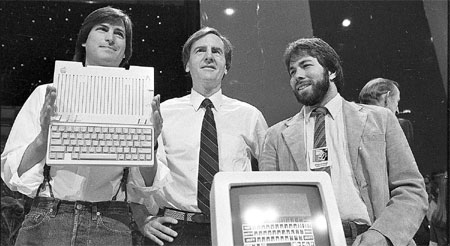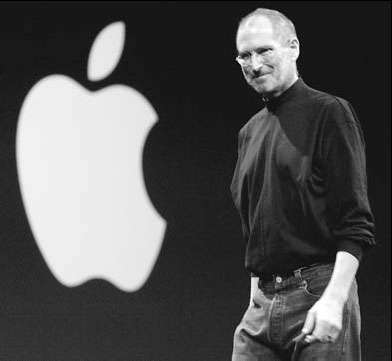Steve Jobs 'may never be equaled'
Updated: 2011-10-07 08:46
By Poornima Gupta and Peter Henderson (China Daily)
|
|||||||||
|
In this April 24, 1984 photo, from left, Steve Jobs, chairman of Apple Computer, John Sculley, president and CEO, and Steve Wozniak, co-founder of Apple, unveil the Apple IIc computer in San Francisco. Sal Veder / AP Photo |
|
Steve Jobs smiles during the Macworld Convention and Expo in San Francisco, California on Jan 15, 2008. Robert Galbraith / Reuters |
Apple visionary changed how we used technology
SAN FRANCISCO - Passionate, prickly and deemed irreplaceable by many Apple fans and investors, Steve Jobs made a life of defying conventions and expectations.
And despite years of poor health, his death on Wednesday at the age of 56 prompted a global gasp as many people remembered how much he had done to transform the worlds of computing, music and mobile phones, changing the way people communicate and access information and entertainment.
"The world rarely sees someone who has had the profound impact Steve has had, the effects of which will be felt for many generations to come," said Microsoft co-founder and long-time rival Bill Gates.
"For those of us lucky enough to get to work with him, it's been an insanely great honor."
The founder of Apple Inc died on Wednesday in Palo Alto, California, surrounded by his family. Jobs had a long battle with cancer and other health issues.
A college dropout with a passion for minimalist design and a marketing genius, Jobs changed the course of personal computing and brought a revolution to the mobile market.
The iconic iPod, the iPhone and the iPad are the creation of a man who was known for his near-obsessive control of the product development process.
Charismatic, visionary, ruthless, perfectionist, dictator - these are some of the words that people have used to describe Jobs, who may have been the biggest dreamer the technology world has ever known, but who was also a hard-edged businessman and negotiator.
"Steve was the best of the best. Like Mozart and Picasso, he may never be equaled," said Marc Andreessen, venture capitalist and co-founder of Netscape Communications.
It's hard to imagine a bigger success story than Steve Jobs, but rejection, failure and bad fate were part and parcel of who he was.
Jobs grew up in Silicon Valley, which was changing from a place filled with orchards to homes for workers at Lockheed and other defense and technology companies.
Electronics friend Bill Fernandez introduced him to boy engineer Steve Wozniak, and the two Steves began a friendship that eventually bred Apple Computer.
"Woz is a brilliant engineer, but he is not really an entrepreneur, and that's where Jobs came in," recalled Fernandez, who was the first employee at Apple.
Wozniak said his goal was only to design hardware and he had no interest in running Apple.
"Steve Jobs' role was defined - you've got to learn to be an executive in every division of the company so you can be the world's most important person some day. That was his goal," joked Wozniak, who is still listed as an employee, even though he has not worked at Apple for years.
Awful-tasting medicine
Jobs created Apple twice - once when he founded it and the second time after a return credited with saving the company.
Every day to him was "a new adventure in the company", said Jay Elliot, a former senior vice-president at Apple who worked very closely with Jobs in the '80s, adding that he was "almost like a child" when it came to his inquisitiveness.
He was highly intolerant of company politics and bureaucracy, Elliot noted.
But the inspiring Jobs came with a lot of hard edges, often alienating colleagues and investors with his my-way-or-the-highway dictums and plans that were generally ahead of their time.
Elliot was a witness to the acrimony between Jobs and former Apple Chief Executive John Sculley who often clashed on ideas, products and company direction.
The dispute came to a head in 1985 and Jobs left soon after, saying he was fired.
"It was awful-tasting medicine, but I guess the patient needed it. Sometimes life's gonna hit you in the head with a brick. Don't lose faith," Jobs told a Stanford graduating class in 2005.
He returned to Apple about a decade later, working as a consultant. Soon he was running it, in what has been called Jobs' second act.
Jobs reinvented the technology world four or five times, first with the Apple II in the 1970s; then in the 1980s with the Macintosh, the ubiquitous iPod debuted in 2001, the iPhone in 2007 and in 2010 the iPad, which a year after it was introduced outsold the Mac.
"He put white earbuds in the ears of everyone on the planet, and shut us all in to our own little pods of experience," recalled Ed Niehaus, who was hired by Jobs to do public relations for a resurgent Apple.
Less is more
How did he do it? Design fans, Apple employees and Jobs acquaintances credit a natural design-sense drive to simplify.
A new product or feature begins with 10 ideas good ideas, no also-rans, which are presented as "pixel-perfect" mock-ups. Apple culls the 10 to three, which are tried out for months more before a final star is chosen.
When Steve Jobs weighed in, it was with a simple set of verdicts: "insanely great", "really, really, really great" and "shit," Niehaus said.
Being chewed up and spat out by Jobs is an experience most Apple employees who have come in contact with Jobs can relate to.
"I never asked you to start, so why should I ask you to stop?" Jobs told another former Apple employee, who wanted to know whether he should continue to work on a project that was being questioned by the forceful CEO.
The real Steve Jobs
Jobs described his world as very simple.
"For the past 33 years I have looked in the mirror every morning and asked myself, 'if today were the last day of my life, would I want to do what I am about to do today?' And whenever the answer has been 'no' for too many days in a row, I know I need to change something," he told Stanford University students in the soul-baring commencement address.
"Remembering that you are going to die is the best way I know to avoid the trap of thinking you have something to lose. You are already naked. There is no reason not to follow your heart," he said.
Apple 3.0
Jobs had been on leave three times since 2004, and he clearly thought about an Apple without him.
Jobs and the Apple board had a succession plan - put his hand-picked successor Tim Cook in charge - and he has left a well-respected team.
"Remembering that I'll be dead soon is the most important tool I've ever encountered to help me make the big choices in life," Jobs said in the commencement speech at Stanford. "Because almost everything - all external expectations, all pride, all fear of embarrassment or failure these things just fall away in the face of death, leaving only what is truly important."
Reuters












